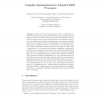Free Online Productivity Tools
i2Speak
i2Symbol
i2OCR
iTex2Img
iWeb2Print
iWeb2Shot
i2Type
iPdf2Split
iPdf2Merge
i2Bopomofo
i2Arabic
i2Style
i2Image
i2PDF
iLatex2Rtf
Sci2ools
116
click to vote
EMSOFT
2001
Springer
2001
Springer
Compiler Optimizations for Adaptive EPIC Processors
Abstract. Advances in VLSI technology have lead to a tremendous increase in the density and number of devices that can be manufactured in a single microchip. One of the interesting ways in which this silicon may be used is to leave portions of it uncommitted and re-programmable depending on an applications needs. In an earlier paper, we proposed a machine architecture for achieving this reconfigurability and compilation issues that such an architecture will face. In this paper, we will elaborate on the compiler optimization issues involved. In particular, we will outline a framework for code partitioning, instruction synthesis, configuration selection, resource allocation, and instruction scheduling. Partitioning is the problem of identifying code sections that may benefit by mapping them on to the programmable logic resources. The instruction synthesis phase generates suitable implementations for the candidates partitions and updates the machine description database with the new in...
EMSOFT 2001 | Instruction Synthesis | Instruction Synthesis Phase | Programmable Logic | Software Engineering |
Related Content
| Added | 28 Jul 2010 |
| Updated | 28 Jul 2010 |
| Type | Conference |
| Year | 2001 |
| Where | EMSOFT |
| Authors | Krishna V. Palem, Surendranath Talla, Weng-Fai Wong |
Comments (0)

